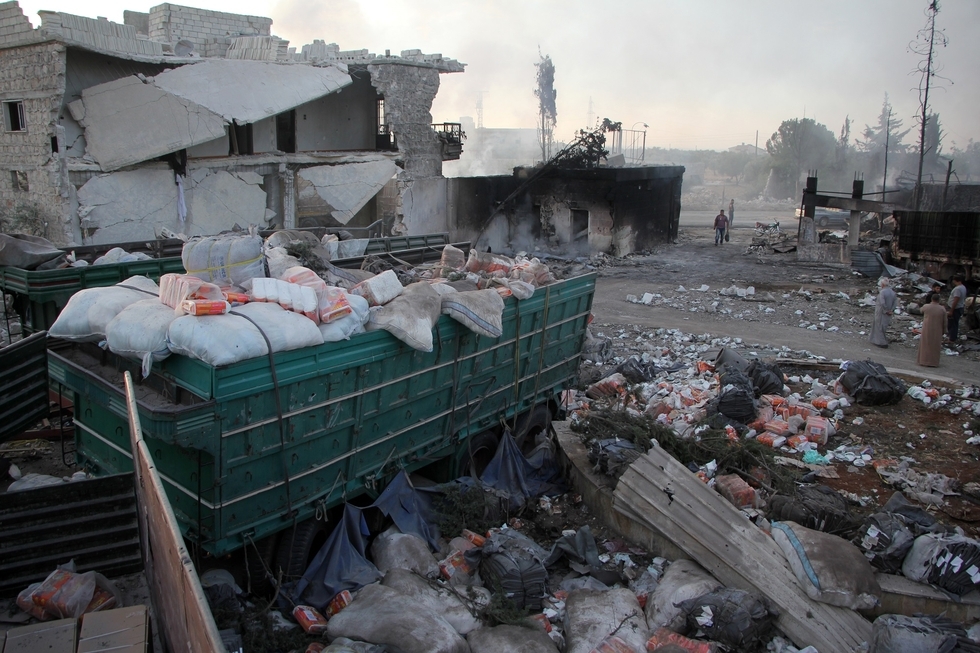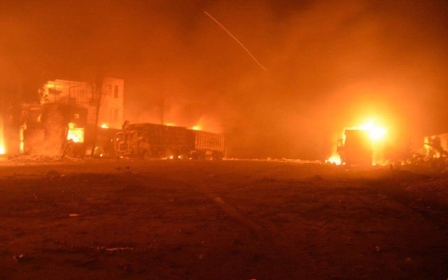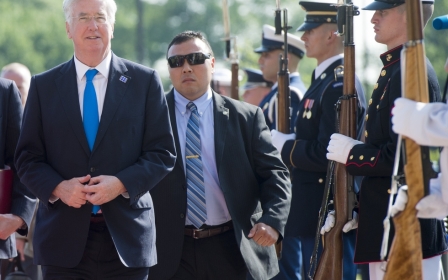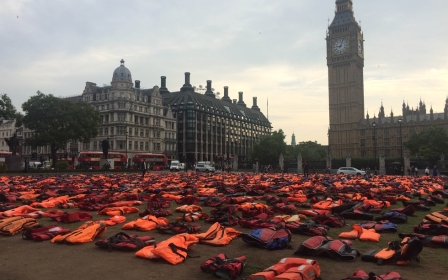Russia and Syria deny they attacked UN aid convoy in Aleppo

Russia and Syria have both denied their forces attacked a humanitarian aid convoy near Aleppo in Syria, described by the UN as a callous act that could amount to a war crime.
"All information on the whereabouts of the convoy was available only to the militants controlling these areas," Russia's defence ministry spokesman Igor Konashenkov said on Tuesday, while adding that there was no evidence the convoy was hit by bombs, and that he believed it had caught fire.
"There are no craters and the exterior of the vehicles do not have the kind of damage consistent with blasts caused by bombs dropped from the air," he said.
Syria's army also said there was "no truth to media reports that the Syrian army targeted a convoy of humanitarian aid in Aleppo province," while Moscow said that the White Helmets civil rescue aid group could not say who was responsible because they had close links to Fateh al-Sham - formerly known as the al-Qaeda affiliate, the Nusra Front. The aid group, which has been nominated for the Nobel Peace Prize, ha strongly denied these links.
Syria's opposition has since hit back at the denials, saying that Russian and Syrian planes had to be behind the bombing. Syrian opposition leader Riad Hijab, who heads up the High Negotiations Committee (HNC), a main opposition umbrella group, slammed the international community for "total weakness" in what it said was brutal agression by the Syrian government and its allies.
The UN on Tuesday suspended all aid convoy movements in Syria, after 18 of its trucks were destroyed in the attack near Orum al-Kubra, as a seven-day ceasefire ended and the country once more descended into chaos.
It said it that it had repeatedly asked "parties to the conflict" to stop the attack and that, "despite our efforts... further air strikes continued throughout the night, hampering efforts to reach and attend to the wounded".
UN aid chief Stephen O'Brien said: "Let me be clear: if this callous attack is found to be a deliberate targeting of humanitarians, it would amount to a war crime."
The Red Crescent said the attack may have "serious repercussions" for its humanitarian work in Syria.
Despite the resumption of violence, the US, Russia and the UN's envoy to Syria all said on Tuesday that the ceasefire process was not dead.
Russia's Foreign Minister Sergei Lavrov was meeting his US counterpart John Kerry in New York as part of the International Syria Support Group.
On Monday the Syrian army said it no longer considered the truce valid, while Russia said it was "pointless" due to infractions by rebel groups.
The Red Crescent said an estimated 20 civilians, including at least one of its volunteers, were killed in the attack. It was suspending operations for three days in protest.
The US State Department said it was outraged by the attack, which it would raise "directly with Russia", and said it would reassess "the prospect of future coooperation" with Moscow in Syria.
Twitter users on Monday posted still images taken from a Russian livestream of Aleppo, saying they showed the convoy that was later attacked.
Peter Maurer, the president of the International Committee of the Red Cross (ICRC), said: “From what we know of yesterday's attack, there has been a flagrant violation of international humanitarian law, which is totally unacceptable.
"Failing to respect and protect humanitarian workers and structures might have serious repercussions on ongoing humanitarian operations in the country, hence depriving millions of people from aid essential to their survival."
The Syrian Red Crescent, which operates as part of the ICRC, named the dead worker as Omar Barakat, who headed the organisation's sub-division in Orum al-Kubra.
New MEE newsletter: Jerusalem Dispatch
Sign up to get the latest insights and analysis on Israel-Palestine, alongside Turkey Unpacked and other MEE newsletters
Middle East Eye delivers independent and unrivalled coverage and analysis of the Middle East, North Africa and beyond. To learn more about republishing this content and the associated fees, please fill out this form. More about MEE can be found here.




